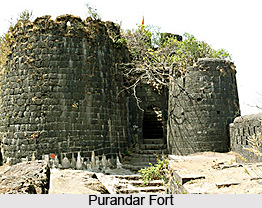 Shivaji was compelled to sign the Treaty of Purandar after Jai Singh beleaguered the Purandar fort. When Shivaji realised that war with the Mughal Empire would cause damage to the empire he chose to sign a treaty instead of leaving his men under the Mughal supervision.
Shivaji was compelled to sign the Treaty of Purandar after Jai Singh beleaguered the Purandar fort. When Shivaji realised that war with the Mughal Empire would cause damage to the empire he chose to sign a treaty instead of leaving his men under the Mughal supervision.
The main conditions of Treaty are:
* Shivaji had twelve forts under him, along with an area worth income of 1 lakh huns.
* Shivaji had to help the Mughals whenever and wherever required.
* Shivaji`s son Sambhaji was given the responsibility of commanding 5,000-strong force under the Mughals.
* If Shivaji wanted the Konkan area under Vijapur`s control, he would have to pay 40 lakh huns to the Mughals.
* He had to give up his forts to the Mughals at Purandar, Rudramal, Kondhana, Khandagla, Lohagad, Isagad, Tung, Tikona, Rohida, Nardurga, Mahuli, Bhandardurga, Palaskhol, Rupgad, Bakhtgad, Morabkhan, Manikgad, Saroopgad, Sakargad, Marakgad, Ankola, Songad, and Maangad.
Shivaji also agreed to visit Agra in order to meet Aurangzeb for further political talks.
This article is a stub. You can enrich by adding more information to it. Send your Write Up to content@indianetzone.com.



















